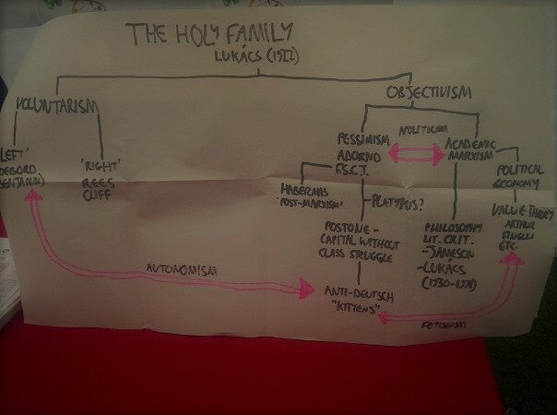|
by Himanshu Damle In the Hegelian Marxism of Lukács, for instance, the historicist problematic begins from the relativisation of theory, whereby that it is claimed that historical materialism is the “perspective” and “worldview” of the revolutionary class and that, in general, theory (philosophy) is only the coherent systematisation of the ideological worldview of a social group. No distinction of kind exists between theory and ideology, opening the path for the foundational character of ideology, expressed through the Lukácsian claim that the ideological consciousness of a historical subject is the expression of objective relations, and that, correlatively, this historical subject (the proletariat) alienates-expresses a free society by means of a transparent grasp of social processes. The society, as an expression of a single structure of social relations (where the commodity form and reified consciousness are theoretical equivalents) is an expressive totality, so that politics and ideology can be directly deduced from philosophical relations. According to Lukács’ directly Hegelian conception, the historical subject is the unified proletariat, which, as the “creator of the totality of [social] contents”, makes history according to its conception of the world, and thus functions as an identical subject-object of history. The identical subject-object and the transparency of praxis therefore form the telos of the historical process. Lukács reduces the multiplicity of social practices operative within the social formation to the model of an individual “making history,” through the externalisation of an intellectual conception of the world. Lukács therefore arrives at the final element of the historicist problematic, namely, a theorisation of social practice on the model of individual praxis, presented as the historical action of a “collective individual”. This structure of claims is vulnerable to philosophical deconstruction (Gasché) and leads to individualist political conclusions (Althusser). In the light of the Gramscian provenance of postmarxism, it is important to note that while the explicit target of Althusser’s critique was the Hegelian totality, Althusser is equally critical of the aleatory posture of Gramsci’s “absolute historicism,” regarding it as exemplary of the impasse of radicalised historicism (Reading Capital). Althusser argues that Gramsci preserves the philosophical structure of historicism exemplified by Lukács and so the criticism of “expressive totality,” or spiritual holism, also applies to Gramsci. According to Gramsci, “the philosophy of praxis is absolute ‘historicism,’ the absolute secularisation and earthiness of thought, an absolute humanism of history”. Gramsci’s is an “absolute” historicism because it subjects the “absolute knowledge” supposed to be possible at the Hegelian “end of history” to historicisation-relativisation: instead of absolute knowledge, every truly universal worldview becomes merely the epochal totalisation of the present. Consequently, Gramsci rejects the conception that a social agent might aspire to “absolute knowledge” by adopting the “perspective of totality”. If anything, this exacerbates the problems of historicism by bringing the inherent relativism of the position to the surface. Ideology, conceptualised as the worldview of a historical subject (revolutionary proletariat, hegemonic alliance), forms the foundation of the social field, because in the historicist lens a social system is cemented by the ideology of the dominant group. Philosophy (and by extension, theory) represents only the systematisation of ideology into a coherent doctrine, while politics is based on ideological manipulation as its necessary precondition. Thus, for historicism, every “theoretical” intervention is immediately a political act, and correlatively, theory becomes the direct servant of ideology. The article is taken from:
0 Comments
Leave a Reply. |
Steven Craig Hickman - The Intelligence of Capital: The Collapse of Politics in Contemporary Society
Steven Craig Hickman - Hyperstition: Technorevisionism – Influencing, Modifying and Updating Reality
Archives
April 2020
|

 RSS Feed
RSS Feed
